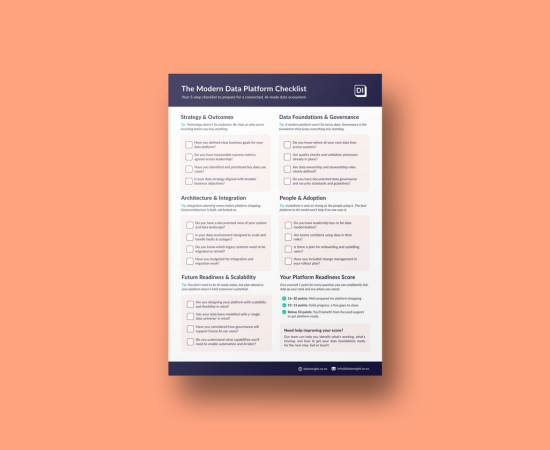Hiring a full-time data analyst or data scientist can feel like the logical first step toward becoming a more data-driven organisation.
And in many cases, it’s a good one. But scaling data capability is about more than just making your first hire or relying solely on an internal team.
Modern data needs often stretch far beyond the capacity of a small team or a single expert. Without the right support structure, internal teams can quickly become overworked, progress can stall, and opportunities for innovation can be missed.
This doesn’t mean in-house teams are not valuable. The key is finding a model that gives you access to the right expertise at the right time, without overloading your people or adding unnecessary overhead.

The limits of a single hire
Hiring a skilled data analyst, scientist, or engineer can be a smart step toward becoming more data-driven. But modern data needs have evolved far beyond what any one person can realistically cover.
Areas like analytics, cloud engineering, machine learning, automation, governance, and stakeholder engagement all demand specialised knowledge. Expecting one person to stretch across all of them often leads to slower progress, growing frustration, and unmet expectations.
Even the most talented individuals face challenges when they are pulled in too many directions or asked to deliver work outside their core strengths.
Where small internal data teams hit roadblocks
Many organisations have small, capable internal data teams. These teams know the business, care deeply about the work, and are invested in delivering results. But over time, competing priorities can slow things down.
Internal teams are often pulled in multiple directions: responding to urgent requests, fixing broken pipelines, supporting business reporting, or helping other teams troubleshoot data access issues. This leaves little time for more strategic, forward-looking work.
It’s rarely a question of skill. It’s a question of bandwidth, breadth, and having the breathing room to drive real progress. When momentum stalls, leadership may start to question the return on investment. Teams can feel frustrated, overworked, or disconnected from the value they want to deliver.
Here’s what modern data capability actually requires
Delivering long-term value from data typically requires a blend of skills that go beyond what most individuals or small teams can realistically cover on their own. This often includes:
· Analytics and dashboarding: Turning raw data into useful insights
· Data engineering and architecture: Building and maintaining pipelines and infrastructure
· Cloud integration: Using cloud technologies for scale and performance
· Machine learning and AI: Developing models and automation tools where appropriate
· Data governance and compliance: Ensuring data quality, security, and regulatory alignment
· Stakeholder engagement: Translating technical work into business value
Most small to mid-sized organisations don’t need all of these roles full-time. But they do need access to these capabilities at the right time, in the right way.
Choosing the right support model
There is no one-size-fits-all approach to building data capability. What works best depends on your goals, maturity, and available resources. The key is understanding the trade-offs of each option.
.png)
Rather than relying on a single hire or one fixed model, many organisations now use flexible partnerships that complement their internal teams. This allows them to scale capability, fill gaps quickly, and keep projects moving without adding unnecessary overhead.
So, how do you scale data capability?
Building strong data capability is not about how many people you hire. It is about having access to the right expertise at the right time, in a way that fits your organisation.
That might mean bringing in support to launch a new project, adding extra hands when internal teams are stretched, or accessing specialist skills that you do not need every day. Flexibility gives you room to move. Breadth ensures nothing important gets missed.
Internal teams are a critical part of the equation. But expecting them to cover everything alone can create pressure, delay progress,and limit impact. With the right mix of internal knowledge and externalsupport, you can move faster, deliver more value, and build capability that lasts.








.png)